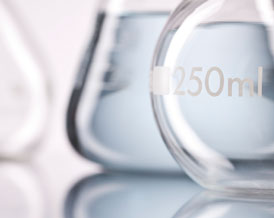
My very first job in science was in a lab that worked exclusively with RNA, and it was only after I moved on to a different job that I learned just how much different the world of DNA research is from that of RNA. When working with DNA, for example, you rarely if ever have the sample you have labored over reduced to a fuzzy blur at the bottom of a gel because it has been degraded beyond rescue. With RNA, unfortunately, this happens all too frequently. In fact, a labmate of mine once put up a poll on the door to our lab asking if it was better to discover that your RNA sample was degraded on a Monday or a Friday.
The culprits in this scenario are Ribonucleases (RNases). They are everywhere. They are incredibly stable and difficult to inactivate. And, if you work with RNA, they are your enemy. Take heart though, they can be defeated if you follow some pretty simple steps.
- Wear gloves and use sterile technique when handling RNA or reagents that will be used with RNA. The most common sources of RNase contamination are hands and bacteria or mold that could be lurking on dust particles or on glassware.
- Use sterile, disposable plasticware. These products are typically RNase-free and don’t require treatment to inactivate RNases.
- Treat non-disposable glassware and plasticware before you use it. For glassware, bake it at 250°C overnight. For plasticware, rinse it with 0.1N NaOH/1mM EDTA and then with diethyl pyrocarbonate (DEPC)-treated water.
- Reserve a set of chemicals and solutions needed for RNA isolation and analysis as “RNA Only” and keep them separate from reagents for other applications. Wear gloves whenever you handle these reagents, and use sterile labware to measure them.
- Beware! Autoclaving alone is not sufficient to inactivate all RNases. Solutions that you prepare in the lab should be treated by adding DEPC to 0.05%* and incubated overnight. Autoclaving the treated solutions for 30 minutes will remove any trace of the DEPC from the solution.
- Establish an “RNA Only Work Zone” in your lab that has dedicated equipment, reagents, labware, etc.
- Using RNase inhibitors such as Recombinant RNasin® Ribonuclease Inhibitor will help prevent RNA degradation by inhibiting some RNases.
Tris-based buffers cannot be treated with DEPC! Purchase Tris that is tested RNase-free. You can use DEPC-treated or nuclease-free water to make your Tris-buffered solutions.
*In case you were curious about it:
0.05% DEPC (v/v) Solution
50µl DEPC per 100ml solution
[DEPC is a suspected carcinogen.]
Finally, the battle against Ribonuclease is a never ending one, so stay vigilant.
As for the poll that my labmate put up; the results were split pretty equally between those who preferred to have their week ruined (Monday) and those who preferred their weekends ruined (Friday). If you would like to vote, leave your vote as a comment and I will pass the results along.

Hands down I would rather have it ruined on a Friday, while the week would have been a waste I can at least go out and drink after the the results are in.
Thanks for the vote, Anne. Friday was my choice as well, but it is surprising the number of people who would rather have the bad news on a Monday. Personally, I would love to hear their rational. Anyone?
waooo…!!!
a nice one…!
its not easy to be rnases-freee….!
Monday for me. The weekend wouldn’t be ruined!